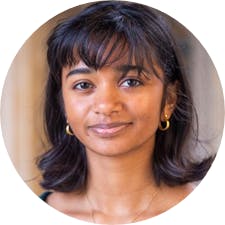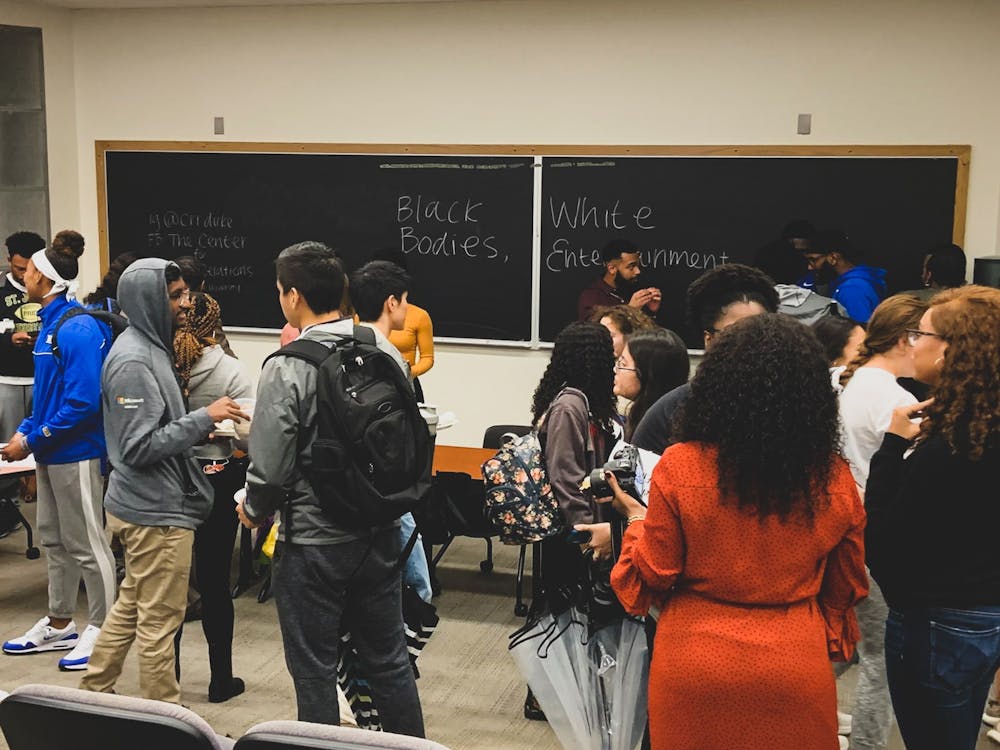At a panel discussion Wednesday, four Duke student-athletes explored the unique experience of living as a black athlete in a predominantly white team and college.
The conversation focused around school/sport life balance, historically black colleges and universities (HBCU) and the unique experience of living as black student-athletes at a predominantly white institution (PWI).
Entitled “Black Bodies, White Entertainment,” the discussion was hosted by the Center for Race Relations and moderated by Martin Paul Smith, a former college athlete and assistant professor of the practice of education. Jemele Hill’s article “It’s Time for Black Athletes to Leave White Colleges,” inspired the panel.
The conversation started with each student emphasizing their academic and athletic prowess, sharing highlights from both spheres of their lives, including important season highlights and various placements on honor rolls.
The students emphasized, however, that as black athletes, they are often perceived as less academically capable by their classmates.
“I try extra hard—almost try to overdo it—just to prove myself,” Kyra Lambert, point guard for the women’s basketball team and graduate student at the Fuqua School of Business, said about her experience as the only black woman in her 65 person graduate school class.
“I might play a sport, I might be black, but I’m here for a reason, just like you all,” shared junior Damani Neal, a safety on the football team majoring in sociology.
The panel also discussed code-switching, or the act of presenting differently in front of different groups of people, as a black athlete. Each student shared at least some level of code-switching, especially in front of coaches
“You know that there’s already a disconnect between you and your coaches, just on the basis of race, so you don’t want to give them even more of a reason to continue to hone in on that, and drive that disconnect home and put you at a disadvantage,” Neal said.
This led to a larger discussion about power structures and race in sports. Smith asked how each of the students reconcile the fact that head coaches and athletic directors, who are overwhelmingly white, get to touch money, while the predominantly African-American players who generate that money are kicked out or have their scholarships revoked should they touch it.
“I’m just going to rip the Band-Aid off. It looks a lot like slavery,” Lambert said.
Neal agreed, suggesting that the relationship between a head coach and an athlete looks very similar to the master-slave dynamic.
“What they say goes, in any regard, whether it pertains to football, your social life, your academics, whatever,” he said.
Sophomore Alexis Joseph, defense player for women’s lacrosse majoring in visual arts, emphasized the physical toll that sport puts on athletes. Profiting on athletes’ putting their bodies on the line mirrors slavery in many ways, she said.
Neal added that despite these unbalanced power dynamics, their grievances are often disregarded.
“Their response is, ‘Well, you’re getting your degree for free,’” he said. “But I think about it like this: at one point in time, slaves were granted their papers. They could go free with literally nothing. But that doesn’t mean they still weren’t hurting physically and emotionally from slavery. And it’s very identical for us.”
The panel then addressed just how packed their schedules are, with days filled with treatment, practice, weights and study hall. Athletes have to balance this time, spent almost entirely with the team, with the overwhelming school workload of a typical Duke student.
“We’re doing all this and we’re still getting the work done on time and correctly,” said senior J.T. Giles-Harris, defense player for men’s lacrosse majoring in public policy. “We’re still putting in the work academically to succeed.”
Joseph noted that as the only black athlete on the women’s lacrosse team, her tight schedule also means spending less time with people who look like her.
“I just spend all of this time with my team, now I want to go spend time with my black friends,” she said.
No one sitting on the panel had a black head coach.
“I think sometimes they’d rather ignore that I’m the only [black person] than understand why I act the way I do occasionally,” Joseph said.
Lambert shared a different story. She said that her coaching staff was pretty diverse and that they now have two black female coaches who relate to the players “more than anyone else on the coaching staff.” She also noted that her head coach, a white female, makes a good effort to understand different cultural references.
Smith also asked each of the students whether or not they had considered playing for a historically black college or university, which Hill encouraged in the article that motivated the discussion to be organized. The panel unanimously responded, “no.”
All four students cited the lack of strong sports teams at HBCUs as the primary motivator in their decision to matriculate to Duke, a PWI. The panelists added that Hill’s urging black athletes to attend HBCUs was unfeasible.
“That article was asking 17 and 18 year olds to think bigger,” Lambert said. “I just think it would take a massive shift in thought and mindset in order to do that.”
Joseph also acknowledged the positive long-term impact of more high-performing athletes attending HBCUs, but commented that her internal competitive drive pushed her toward the chance of “a national championship and that rank.”
Above all, one note remained consistent throughout the panel discussion: the importance of being yourself.
“I went on a recruiting trip maybe my sophomore or junior year and I wore Timbs and a polo and the coach was like, ‘Yeah, don’t worry. Once you come here you’ll lose your Timbs for Sperrys.’ And I looked at my mom and was like, ‘Yeah, I like my Timbs,’” Giles-Harris said.
Get The Chronicle straight to your inbox
Signup for our weekly newsletter. Cancel at any time.

Preetha Ramachandran is a Trinity senior and diversity, equity and inclusion coordinator for The Chronicle's 118th volume. She was previously senior editor for Volume 117.

